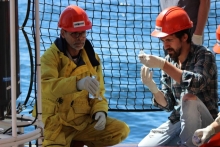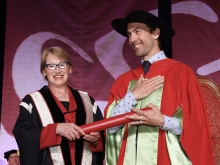
Pursuing an Arctic research dream
Lizz Webb, a PhD student in the Department of Atmospheric and Oceanic Sciences here at McGill University, spent a week in Svalbard, a Norwegian archipelago barely 1,000 kilometres from the North Pole, as part of her studies.

Join visiting Artist in Residence Jan van Esch for two talks on sustainability
TUESDAY November 22. GHABH - The poison in the gift, Part I: Giving and receiving - considering commercial determinants of health.

Combining Art with Science
Using real geochemical data from the archaeological site of Itzan, Guatemala, and computer-generated artwork, PhD candidate Benjamin Keenan (Department of Earth and Planetary Sciences) has produced a video that brings the ancient Mayan civilization to life. Funded by a FRQ DIALOGUE grant (the first for the Faculty of Science), his video has been shown at over 10 exhibitions and conferences, both locally and internationally.

What's it like to be a Biology student at McGill?
Join five current Biology students as they share their stories of finding their place and pursuing diverse paths within the discipline in this new video: A Glimpse Into Biology at McGill. To learn more about the inspiration for this video, read Video marks launch of Department of Biology outreach campaign.
Science Outreach is hiring!
We're looking for a Science Outreach Educator to join our team. They will assist the Faculty’s Science Outreach unit in promoting and enhancing the visibility of outreach, provide training opportunities to McGill students and staff using evidence-based best practices and assist with the communications and evaluation components of the Outreach program.

Alfonso Mucci elected Fellow of the American Geophysical Union
Alfonso Mucci, Emeritus Professor in the Department of Earth and Planetary Sciences, has been elected an American Geophysical Union (AGU) Fellow. He joins 53 other individuals in the 2022 Class of Fellows. AGU, a nonprofit organization that supports 130,000 enthusiasts to experts worldwide in Earth and space sciences, annually recognizes a select number of individuals as part of its Honours and Recognition program.

Undergraduate students celebrated for summer research
On August 10, thirty or so undergraduate students gathered in Leacock 232 to share their experiences as researchers in the Faculty of Science over the summer.

The Redpath Museum moves outdoors this summer
Enjoy the beautiful summer weather and join the Redpath Museum outdoors to see and touch specimens from their natural history and world cultures collections. Fossils, skulls, minerals, ancient pottery... you never know what you'll find!
Every Wednesday and Thursday through August 18th: 10:00 am - 2:00 pm. Different themes each day. Cancelled if it rains.

Outreach skills and entrepreneurship
Wondering how the skills you develop doing science outreach can help with your future endeavours? Read about Dr.
Faculty of Science Excellence Award winners announced
2022 award winnersThe Faculty of Science Excellence Awards recognize outstanding performance and contributions made by members of the Faculty’s administrative and support staff classified in four categories: Academic Associate, Clerical, Management, and Technical. The committee, comprised of staff members from each department, received nominations for three of these categories.

Gabriel Venne wins Leo Yaffe Award
The recipient of the Leo Yaffe Award for 2022 is Gabriel Venne, assistant professor in the Department of Anatomy and Cell Biology. The award is given each year to recognize a faculty member for superior teaching at the undergraduate level in the Faculty of Science.

Making data science accessible to all
The Faculty of Science’s new Computational and Data Systems Initiative will help researchers unlock the power of data-intensive research methods

Science students share their passion with school students across Québec
McGill students participated for the first time this year in École en réseau and Cœur des sciences, two programs that provide programming for elementary and secondary school students across Quebec. Read about McGill students Jeremy Dawkins and Kirsten Crandall's engaging collaborations with École en réseau and Cœur des sciences in McGill dans la ville's article

McGill Chemistry Outreach Group founders describe the group's work in new tribute
Founding members of the award-winning McGill Chemistry Outreach program have documented the inception and work of the group in Beyond exploding balloons- bringing the science of chemistry to the public, a new piece in the Canadian Journal of Chemistry.

McCall MacBain Scholarships set to open to international applicants
Join the first global cohort of McCall MacBain Scholars!Are you interested in mentorship, leadership skills development, and full funding to start a graduate degree?
